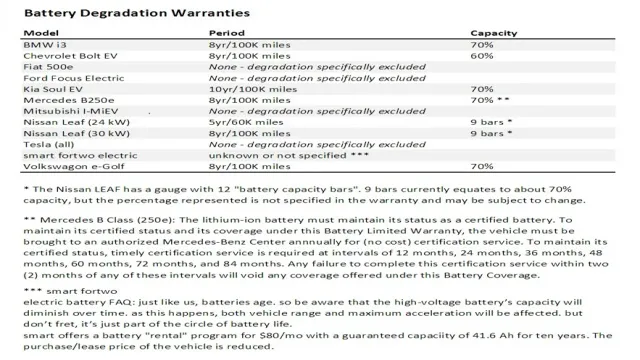Electric cars are becoming increasingly popular, and with that comes an important question: what is the warranty on electric car batteries? With so many different types of electric cars on the market, it’s important to understand the basics of electric car battery warranties.
In this blog post, we’ll explore the ins and outs of electric car battery warranties and provide tips on how to get the most out of your warranty. We’ll look at common warranties offered by electric car manufacturers, what to do if you experience any problems with your electric car battery, and how to extend the life of your battery.
What do Electric Car Battery Warranties Cover?
Electric cars are becoming increasingly popular around the world due to their environmental friendliness and lower running costs. However, many people are concerned about the durability and reliability of electric vehicle batteries and what kind of warranty an electric car battery is covered by. Understanding electric car battery warranties is important to ensure you are aware of the coverage you have should something go wrong.
Most electric car manufacturers offer a warranty of up to 8 years or 100,000 miles, whichever comes first. This warranty covers the battery and all its associated components, such as the cells, the control module, and the cooling system. The warranty typically covers any issues that arise due to defects in materials or workmanship.
This means that any problem that is the result of a manufacturing fault or engineering issue will be covered by the warranty. However, the warranty does not typically cover general wear and tear or any damage caused by misuse or neglect. It is important to note that the warranty may vary depending on the manufacturer and the model of the electric car you have.
Some electric car manufacturers may offer additional coverage, such as a warranty for the battery’s capacity. This means that if the battery’s capacity falls below a certain level, the manufacturer will replace it. In addition to the warranty provided by the manufacturer, you may be able to get extra coverage from an extended warranty.
These warranties typically provide additional coverage for things like repairs and replacements and can be purchased for a period of up to three years. When it comes to electric car batteries, understanding the warranty coverage is essential. Make sure you read through the warranty provided by the manufacturer, and consider purchasing an extended warranty to ensure you are covered in the event of a problem.
Length of Coverage
When considering an electric car, one of the most important factors to consider is the warranty on the battery. In general, electric car batteries come with a warranty that is longer than that of a gasoline-powered car, ranging from three to eight years, depending on the make and model of the vehicle. During this period, the manufacturer will replace the battery if it fails due to a defect in materials or workmanship or if it fails to meet the manufacturer’s minimum performance requirements.
In some cases, the manufacturer may even offer an extended warranty, which covers the cost of any repairs or replacements for up to ten years. It’s important to note that the warranty only covers the battery itself and not the other components of the electric car, such as the motor, the charging system, or the electronics. Additionally, any damage caused by misuse or neglect is not covered by the warranty.
To ensure you get the most out of your warranty, it’s essential to follow the manufacturer’s instructions for use and maintenance.

Replacement and Repair Costs
When it comes to warranties on electric car batteries, the answer can vary greatly depending on the manufacturer. Generally speaking, most automakers offer an eight-year/100,000-mile warranty on electric car batteries. However, some automakers may offer a longer warranty, while others may offer a shorter one.
Additionally, some automakers may offer a more comprehensive warranty that covers both the battery and the components that make up the electric car. It is important to read the warranty information provided by the manufacturer and understand what it covers before making a purchase. In the event that the electric car battery needs to be replaced or repaired, the cost of this will depend on the specific manufacturer and type of battery.
What is Not Covered by Electric Car Battery Warranties?
Electric cars are becoming increasingly popular as an eco-friendly alternative to traditional gasoline-powered vehicles. While electric cars are often more expensive than their gasoline-powered counterparts, they offer several advantages, including lower maintenance costs and fewer emissions. However, one of the biggest concerns for electric car owners is the warranty on their electric car batteries.
When purchasing an electric car, it’s important to understand what is and isn’t covered by the battery warranty. Depending on the make and model of the electric car, the warranty may cover defects in materials or workmanship, as well as the performance of the battery. However, it’s important to note that the warranty does not cover damage caused by normal wear and tear, nor does it cover any damage due to misuse or neglect.
Additionally, some warranties may not cover damage caused by overcharging or discharging the battery beyond its rated capacity. It’s also important to note that most electric car battery warranties are limited in time and mileage, meaning that the warranty will expire after a certain number of years or miles driven. Additionally, some warranties may be prorated, meaning that the amount of coverage decreases over time as the battery’s performance begins to degrade.
When purchasing an electric car, it’s important to read the warranty carefully. This will ensure that you understand what is and isn’t covered by the warranty, as well as how long the warranty is valid. Additionally, it’s important to keep all receipts and paperwork, as this may be necessary to claim if your electric car battery fails.
By understanding the terms of your electric car battery warranty, you can ensure that you’re covered in the event of a battery failure.
Accidental Damage
Electric car batteries are an important component of any electric vehicle. While these batteries are designed to last for years, they may still be prone to damage from accidental or environmental factors. Fortunately, many electric car manufacturers offer warranties on their batteries, so you can be sure that you’re covered in case of any unexpected damage.
However, it’s important to understand exactly what is covered by the warranty and what isn’t so you can be sure that you’re properly protected. Knowing the warranty on your electric car battery is the best way to ensure that you’re covered in the event of any unexpected damage.
Manufacturing Defects
When it comes to electric car batteries, the warranty coverage can vary greatly depending on the manufacturer and the type of battery. Generally, electric car batteries are covered by a limited warranty for a certain period, up to as much as 8 years or sometimes even more. This warranty usually covers any defects in material or workmanship, so if something goes wrong with your battery due to a manufacturing defect, you should be able to get it covered.
Battery Age
When it comes to electric car batteries, one of the most important questions to ask is, “What is the warranty on an electric car battery?” After all, batteries are a critical component of any electric vehicle, and it’s important to know that your battery will be covered in the event of a malfunction. Fortunately, most electric car manufacturers offer warranties on their batteries. These warranties typically cover defects in materials or workmanship for a set period or number of miles driven.
The specific details of these warranties may vary from manufacturer to manufacturer, but in general, they provide peace of mind that your electric car battery is protected.
How to Maximize Your Electric Car Battery Warranty
Electric cars are becoming increasingly popular, and for good reason. Not only are they better for the environment, but they also offer significant cost savings over traditional gasoline-powered vehicles. While the cost savings of an electric car can be great, there are still some potential costs associated with owning one.
One of those costs is the warranty on an electric car battery. The warranty on an electric car battery is an important factor to consider when purchasing an electric car, as it can help protect you from costly repairs or replacements in the future. Generally, electric car batteries come with a 3-year/36,000-mile warranty, although some manufacturers may offer longer warranties.
It is important to understand the terms of the warranty before purchasing, as some may cover only certain types of repairs or replacements and may not cover the full cost of a new battery. Additionally, some warranties may require the owner to have the car serviced regularly in order to remain valid, so it is important to read the fine print. In order to maximize the warranty on an electric car battery, it is important to ensure that the battery is properly maintained and cared for.
This includes regularly checking the battery fluid levels and making sure the battery connections are clean and free of corrosion. Additionally, it is important to avoid overcharging the battery or leaving it in a discharged state for too long, as this can damage the battery and void the warranty. Finally, it is important to keep all receipts and documentation of maintenance and repairs performed on the electric car battery.
This can provide proof that the battery was properly maintained and can help if a warranty claim needs to be filed. By following these tips, electric car owners can maximize the warranty on their electric car battery and help ensure that any potential repairs or replacements are covered.
Frequently Asked Questions
How long is the warranty on an electric car battery?
The warranty can vary, but most electric car manufacturers offer warranties of up to 8 years or 100,000 miles.
Does the warranty cover repair and replacement costs?
The warranty may cover repair and replacement costs, but it’s important to check the specific warranty details provided by the manufacturer.
What is not covered by electric car battery warranties?
General wear and tear, damage caused by misuse or neglect, and damage from overcharging or discharging the battery beyond its rated capacity are typically not covered.
Can the warranty cover accidental damage?
The warranty may not cover accidental damage, but it’s important to check the specific warranty details to be sure.
Does the battery’s age affect the warranty coverage?
The warranty coverage is usually limited in time and mileage, so as the battery ages, the coverage may decrease.
Conclusion
Understanding the warranty on electric car batteries is crucial for electric car owners. Most manufacturers offer warranties of up to 8 years or 100,000 miles, covering defects in materials or workmanship. However, it’s important to note that general wear and tear, as well as damage caused by misuse or neglect, is typically not covered.

I am James Beaupre, the founder of batteryvehicleprice.com. With a deep-rooted passion for vehicle batteries, I have dedicated my career to exploring and understanding the intricacies of this crucial technology. My website aims to provide valuable insights and information on battery-powered vehicles, empowering individuals to make informed decisions.
